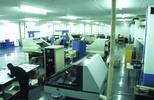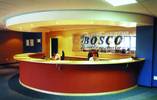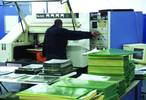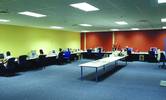

Like many others in the industry I had thought that large-scale manufacture of printed circuit boards (PCBs) in South Africa had virtually ceased some time ago as a result of inequitable competition and absence of import duties on cheap products from the Far East. But that was before I had the opportunity to visit Bosco Printed Circuits (Bosco) which is owned and operated by the Verheul family.
As a visible sign of confidence in the continued success of the local PCB industry Bosco has just relocated to a 16 000 m2 premises it acquired in 1997. After an extensive R7m rehabilitation of the buildings Bosco now occupies 8000 m2 (bigger than the rugby pitch at Loftus) with the rest being leased to several other companies including CST Electronics and one of Bosco's customers, electronic security company MAMI.
Although we now regard the PCB as having been around forever, the technology was in fact only introduced in the late 1950s. It was in the early sixties when it became of interest to the local electronics industry and Bosco, established in 1956 as an anodising business, was ideally suited to implement the technology. The very first one-sided boards were produced using mainly manual techniques in 1966 and the firm has seen continual growth ever since, despite the decline in the other component manufacturers which once made up the important lobby body ECMA.
When current Managing Director, Peter Verheul, joined his father in 1978, the staff complement was a mere five. Today that figure has grown to some 100 and that is with a vast network of computers and automated equipment. Through-hole plating technology and double-sided board manufacture was introduced by Peter during 1982 and the panel size has subsequently been increased to a substantial 570 x 340 mm. Although expansion into multilayer board manufacture has been considered from time to time it has not yet been implemented as even with the latest expansion, capacity on some of the more sophisticated equipment is stretched to the limit with 24 h operation being the norm.
Two things which have ensured the continued competitiveness and growth of Bosco over the years has been its unstinting investment in high-tech equipment and the commitment of its employees to only deliver a quality product. The relocation to the new facility and the additional space available saw the company investing again in a R3m fully automated plating line in addition to an electronic bare board tester and a CNC-controlled drilling machine. In addition to this another R3m investment will be made this year in a complete etch and strip line, removing another capacity bottleneck. In terms of replacement value the high-tech equipment in the Edenvale factory would most likely be worth more than R100m or some three times the annual turnover of the company. What is also interesting is that most of this equipment is so unique that there is no local service or support, so Verheul and his two brothers have been trained to carry out maintenance, calibration and repairs. While Peter Verheul has filled the shoes of his father, now retired, as Managing Director, his brother Andrew is Technical Director with responsibility for production. The youngest brother Philip makes it a totally family and committed concern looking after, as he does, human resources and the ever-important chemical facility.

Bosco is now by far the largest manufacturer of PCBs in South Africa and its growth has been fuelled by the drop-out of other noncompetitive local manufacturers. The focus of local manufacture is small to medium production runs, and although the sales are currently limited to this country, Verheul's goal is to achieve similar levels of cost, quality and consistency that will allow the company to compete in other export markets. For large volume requirements Bosco has formed an alliance with a company in China who build to the local design. In order to ensure continued customer satisfaction Bosco itself takes full responsibility for the product. Peter Verheul himself carries out an annual quality audit on their premises to ensure that the boards produced continue to meet his own exacting standards. With its own niche and the Chinese alliance Bosco can provide a total service from development right through to large volume manufacture. Special boards, including multilayers can also be outsourced for the customers.
Bosco has more than 600 local customers and these include leading names in many sectors, including Kentron, Grintek, Jasco, QD Electronics, Shurlok, MAMI, Radio Data Communications, Sanji Security, Irenco, PFK Electronics and Rhomberg Electronics. The sectors addressed obviously include defence, security, telecommunications, automotive, control electronics and contract manufacturing. Once a job has been undertaken Bosco itself files all relevant documentation, images and tooling so that rapid turnaround without additional make-up costs can be provided even several years later.

The layout of the new plant, having moved from a cramped 2500 m2 facility in Sebenza, is spacious with lots of room for further expansion without utilisation of the equal leased space. As dust and dirt are the worst enemy of the PCB manufacturer, particularly with high density surface mount boards, the critical parts of the plant are maintained with overpressure to Class 10 000 clean room specifications. Possibly a bit of an overkill but then, so also are the card-controlled sliding doors which provide access to the critical production areas. These unique doors are better than those used in hospitals to control the most dangerous viruses and relax after closing onto secure rubber seals. As Verheul indicates "if you want to play in the major league then don't skimp on your equipment and protection".
Core to Bosco's operations is its engineering and CAD/CAM facility where a team of six with multiple workstations ensure that the customers design is checked for integrity before the design of the step and repeat pattern and fiducial marks. This ensures maximum board usage and facilitates the manufacturing process. From sales right through engineering and then through to manufacturing and QA, each job can be tracked on the network with computers available at every one of about 20 work stations.

The mechanical manufacturing facility with numerous multi-spindle CNC drillers, routers and other equipment is as equally impressive as the chemical processing sections with their automated electroplating, tin plating and other processes. In terms of unique capabilities two systems stand out. One is the machine used by QA for pin testing of the final boards before despatch. The testing procedure is automatic with a simple 'pass' or 'fail' output, with a throughput of 600 panels per hour. However, the complex pin jigs used for the testing of individual board layouts are also made and assembled in-house. While the testing is automated, this assembly work is a highly skilled and dexterous task. Like almost every employee at Bosco, training in these skills are provided at the plant as there is no Technikon or University here that turns out suitably-qualified personnel for this.
As an electro-optical engineer myself the pride of place in terms of equipment must go to the Gerber laser photoplotting machine, a R1m masterpiece. This plotter which uses a scanning laser beam to 'write' the board photo-negatives can operate at a resolution of up to 8000 dpi. Although 2000 dpi is more than adequate for Bosco's normal runs, quality and consistency dictate that the company runs standard practice at 4000 dpi. In addition to this sophisticated equipment, Bosco still keeps its older large format photographic mask reducing system operational, as some of the company's longer standing customers still require this technology for older generation non-surface-mount boards.
A critical part of any PCB plant is chemical processing. Bosco employs a full-time graduate chemical engineer who has her own laboratory in which to carry out the required quality control and other checks. Chemistry unfortunately is still somewhat of an enigma for the electronics engineer and proper control is critical to product consistency. In regard to the chemicals themselves Bosco makes use of the US company MacDermid, and the chemical engineer is particularly up-to-date on its product range and new developments.

In order to keep itself abreast of the latest technology Bosco is a long-standing member of the internationally acclaimed Institute for Interconnecting and Packaging Electronic Circuits (IPC). The technical publications and notes from the IPC cover all facets of the PCB manufacturing process and have proved invaluable to the local company in terms of allowing it to improve productivity, quality and consistency, all critical elements for discerning customers.
As for quality, the systems I saw would impress any ISO 9000 assessor, and Bosco intends to seek formal certification within the next 12 to 18 months, after all the hassles of relocation, and a larger than ever order book, have been sorted out. Even without formal certification the company has an all-important quality policy and this includes the astute statement that 'The responsibility of quality rests within every employee of the company, and each individual works towards doing it right the first time.'
As for the name itself, Bosco, Mr Verheul chose that the company be named in honour of Saint Don Bosco, whose principal vocation was the sustenance and education of thousands of destitute children. The name Bosco is thus as appropriate in the new South Africa as it was almost 45 years ago.

© Technews Publishing (Pty) Ltd | All Rights Reserved